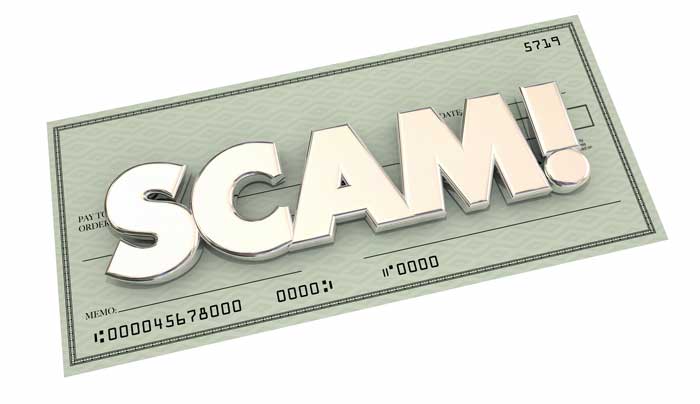
Have you ever seen the Monty Python sketch about Spam?
So, basically there is this old couple eating at a diner along with some Vikings. The waitress is listing items off the menu, which mostly consists of Spam. The elderly lady spouts off to her husband how she doesn’t like spam, to which the Vikings start singing “Spam, Spam, Spam” in harmony. It’s hilarious, if you’re into that type of thing. Okay, now… just imagine instead of the Vikings singing “spam”, they are singing “Scam, Scam, Scam”.
Have you figured out where I’m going with this?
On today’s agenda the topic of discussion is fake checks. There are many variations of this type of scam, but the American Bankers Association (ABA) says that a fake check scam usually starts with an unknown individual paying you a lump sum. The reason could be anything from getting a payment for an item you sold online, to sending you an advance on sweepstakes, or the first installment of funds that you will receive if you agree to transfer money to a foreign country. Often they will also tell you they want it in your bank account to keep the money safe.
These swindlers will send you a check, money order, or a cashier’s check for more than what you are owed and then usually tell you to wire the excess money back to them before you receive your “lump sum payment.” Unfortunately, after you’ve sent the money, you find out the check that they sent you was fraudulent. So, now you’re out of money AND also being used as a money mule.
“Only You Can Prevent Forest Fires” – Smokey the Bear
How can you avoid a fake check scam? What happens if you accidentally send money to a fraudster?
- Don’t accept a check for more than your selling price. If you ONLY accept checks for the exact amount in which you asked for, it makes it that much harder for the scammers to swindle you.
- Don’t be tricked by the appearance of the check. With today’s technology, scammers are able to make counterfeit checks that are almost identical to legitimate ones. If you suspect something fishy, take it to your bank so they can verify the legitimacy.
- Resist the urge for “easy money,” especially if it comes from social media. There is a quote from The Godfather by Mario Puzo that says “behind every great fortune there is a crime.” What I am saying here is that “easy money” is very rarely legal money, so exercise caution and work hard.
- NEVER use money that you receive from a check to buy gift cards for someone you don’t know or wire money to strangers. Scammers love to use gift cards for their dirty work, so once you wire them the money or send the PIN to that gift card, it’s like giving someone cash.
“It’s No Use Crying Over Spilt Milk” – James Howell
Let’s say you did fall victim to a fraudster and their scam, what do you do now? Don’t panic, what’s done is done. But, let’s do some damage control:
- If the payment was sent via gift card, the Federal Trade Commission (FTC) suggest that you call the gift card company to tell them about the scam. In some cases, if acted upon fast enough, you may get your money back.
- The chances of stopping the fraud are slim in this digital age. If you wired money, call the transfer company ASAP to report the scam and file a complaint. You need to ask for the money transfer to be reversed, but the FTC also says this is unlikely to happen.
- If you were tricked with a money order, contact the company that the money order came from and ask them to stop the payment. The FTC recommends that you try and stop the delivery of the money as well by contacting the delivery service that you used.
“Well, Nobody’s Perfect” – Some Like It Hot (1959)
Scams are an unfortunate part of life, especially with the modern technology of today. All you can do is be skeptical and remain calm if you do become a victim of these fraudsters. Contact the authorities to try to get your money back. If you suspect that you have come in contact with a fraudster, contact your bank and report it to the FTC.
Remember, never accept a check for more than your asking price, never send money back to someone who sent you a check, and if you are selling online, consider using an escrow or online payment service. Be wary of everything, talk to someone you trust or contact your bank. Hopefully these tips will save you time, money and heartache.
